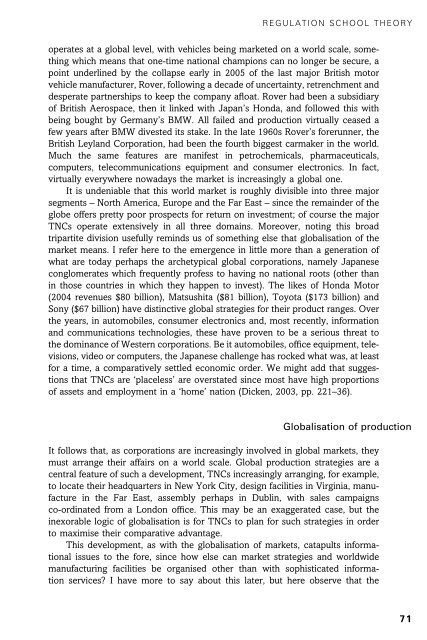Theories of the Information Society, Third Edition - Cryptome
Theories of the Information Society, Third Edition - Cryptome
Theories of the Information Society, Third Edition - Cryptome
You also want an ePaper? Increase the reach of your titles
YUMPU automatically turns print PDFs into web optimized ePapers that Google loves.
REGULATION SCHOOL THEORY<br />
1<br />
1<br />
1<br />
2<br />
1<br />
operates at a global level, with vehicles being marketed on a world scale, something<br />
which means that one-time national champions can no longer be secure, a<br />
point underlined by <strong>the</strong> collapse early in 2005 <strong>of</strong> <strong>the</strong> last major British motor<br />
vehicle manufacturer, Rover, following a decade <strong>of</strong> uncertainty, retrenchment and<br />
desperate partnerships to keep <strong>the</strong> company afloat. Rover had been a subsidiary<br />
<strong>of</strong> British Aerospace, <strong>the</strong>n it linked with Japan’s Honda, and followed this with<br />
being bought by Germany’s BMW. All failed and production virtually ceased a<br />
few years after BMW divested its stake. In <strong>the</strong> late 1960s Rover’s forerunner, <strong>the</strong><br />
British Leyland Corporation, had been <strong>the</strong> fourth biggest carmaker in <strong>the</strong> world.<br />
Much <strong>the</strong> same features are manifest in petrochemicals, pharmaceuticals,<br />
computers, telecommunications equipment and consumer electronics. In fact,<br />
virtually everywhere nowadays <strong>the</strong> market is increasingly a global one.<br />
It is undeniable that this world market is roughly divisible into three major<br />
segments – North America, Europe and <strong>the</strong> Far East – since <strong>the</strong> remainder <strong>of</strong> <strong>the</strong><br />
globe <strong>of</strong>fers pretty poor prospects for return on investment; <strong>of</strong> course <strong>the</strong> major<br />
TNCs operate extensively in all three domains. Moreover, noting this broad<br />
tripartite division usefully reminds us <strong>of</strong> something else that globalisation <strong>of</strong> <strong>the</strong><br />
market means. I refer here to <strong>the</strong> emergence in little more than a generation <strong>of</strong><br />
what are today perhaps <strong>the</strong> archetypical global corporations, namely Japanese<br />
conglomerates which frequently pr<strong>of</strong>ess to having no national roots (o<strong>the</strong>r than<br />
in those countries in which <strong>the</strong>y happen to invest). The likes <strong>of</strong> Honda Motor<br />
(2004 revenues $80 billion), Matsushita ($81 billion), Toyota ($173 billion) and<br />
Sony ($67 billion) have distinctive global strategies for <strong>the</strong>ir product ranges. Over<br />
<strong>the</strong> years, in automobiles, consumer electronics and, most recently, information<br />
and communications technologies, <strong>the</strong>se have proven to be a serious threat to<br />
<strong>the</strong> dominance <strong>of</strong> Western corporations. Be it automobiles, <strong>of</strong>fice equipment, televisions,<br />
video or computers, <strong>the</strong> Japanese challenge has rocked what was, at least<br />
for a time, a comparatively settled economic order. We might add that suggestions<br />
that TNCs are ‘placeless’ are overstated since most have high proportions<br />
<strong>of</strong> assets and employment in a ‘home’ nation (Dicken, 2003, pp. 221–36).<br />
Globalisation <strong>of</strong> production<br />
1<br />
It follows that, as corporations are increasingly involved in global markets, <strong>the</strong>y<br />
must arrange <strong>the</strong>ir affairs on a world scale. Global production strategies are a<br />
central feature <strong>of</strong> such a development, TNCs increasingly arranging, for example,<br />
to locate <strong>the</strong>ir headquarters in New York City, design facilities in Virginia, manufacture<br />
in <strong>the</strong> Far East, assembly perhaps in Dublin, with sales campaigns<br />
co-ordinated from a London <strong>of</strong>fice. This may be an exaggerated case, but <strong>the</strong><br />
inexorable logic <strong>of</strong> globalisation is for TNCs to plan for such strategies in order<br />
to maximise <strong>the</strong>ir comparative advantage.<br />
This development, as with <strong>the</strong> globalisation <strong>of</strong> markets, catapults informational<br />
issues to <strong>the</strong> fore, since how else can market strategies and worldwide<br />
manufacturing facilities be organised o<strong>the</strong>r than with sophisticated information<br />
services? I have more to say about this later, but here observe that <strong>the</strong><br />
71
















